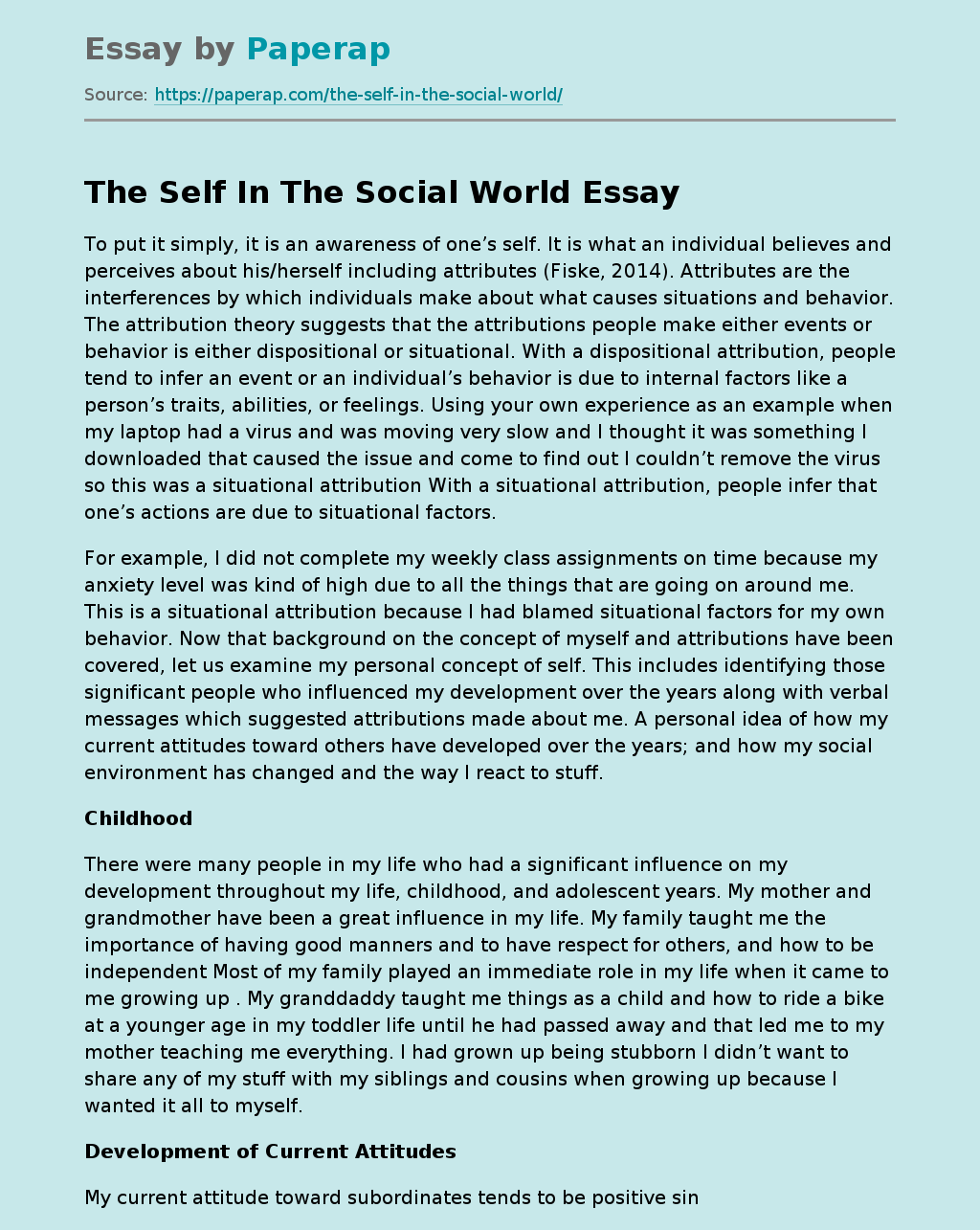The Self In The Social World
To put it simply, it is an awareness of one’s self. It is what an individual believes and perceives about his/herself including attributes (Fiske, 2014). Attributes are the interferences by which individuals make about what causes situations and behavior. The attribution theory suggests that the attributions people make either events or behavior is either dispositional or situational. With a dispositional attribution, people tend to infer an event or an individual’s behavior is due to internal factors like a person’s traits, abilities, or feelings.
Using your own experience as an example when my laptop had a virus and was moving very slow and I thought it was something I downloaded that caused the issue and come to find out I couldn’t remove the virus so this was a situational attribution With a situational attribution, people infer that one’s actions are due to situational factors.
For example, I did not complete my weekly class assignments on time because my anxiety level was kind of high due to all the things that are going on around me.
This is a situational attribution because I had blamed situational factors for my own behavior. Now that background on the concept of myself and attributions have been covered, let us examine my personal concept of self. This includes identifying those significant people who influenced my development over the years along with verbal messages which suggested attributions made about me. A personal idea of how my current attitudes toward others have developed over the years; and how my social environment has changed and the way I react to stuff.
Childhood
There were many people in my life who had a significant influence on my development throughout my life, childhood, and adolescent years. My mother and grandmother have been a great influence in my life. My family taught me the importance of having good manners and to have respect for others, and how to be independent Most of my family played an immediate role in my life when it came to me growing up . My granddaddy taught me things as a child and how to ride a bike at a younger age in my toddler life until he had passed away and that led me to my mother teaching me everything. I had grown up being stubborn I didn’t want to share any of my stuff with my siblings and cousins when growing up because I wanted it all to myself.
Development of Current Attitudes
My current attitude toward subordinates tends to be positive since my goal is to understand them. This current attitude toward subordinates may also derive from my need to belong to a group, gaining trust and respect from my peers. To trust my family with everything around but at some point, you have fed some family with along spoon because everybody can’t be trusted with your business. Some of these people are for the moment.
Social World Effects on Professional Identity
The formation of people’s attitudes toward others tends to fit conditioning. Therefore, my learning experiences in my social world can have a unique effect on my professional identity. As mentioned, my past experiences were not always great. For this reason, I may walk into a room and may immediately feel uncomfortable around someone who triggers past traumas. What can be done to change this attitude? In my professional life I will try my best to work with everybody and get along with them just to the simple fact to make things right. Everything you don’t have to do but when it comes to my attitude to make it better and treat everybody with respect. And try to respect others as respect is given to me and to make peace in my professional life. Sometimes I can’t help my attitude because of some people’s reactions What is the concept of self? To put it simply, it is an awareness of one’s self. It is what an individual believes and perceives about his/herself including attributes. In addition, attributes are the interferences by which individuals make about what causes situations and behavior. The attribution theory suggests that the attributions people make either about events or behavior are either dispositional or situational.
Using my own experience as an example, my laptop caught a virus. I thought I may have downloaded something that made it run slow and I couldn’t figure out how to take it off. Therefore, I inferred that this event occurred because of my lack of knowledge about how to fix a computer. With situational attribution, people infer that one’s actions is due to situational factors. For example, I did not complete my daily Classroom assignment on time because my anxiety level was through the roof. This is a situational attribution because I had blamed situational factors for my own behavior. Self-concepts and the attributions people make in their social world are often developed over a period of many years. My social environment has shaped my professional identity in many ways. My social experiences have contributed to my initial attitude toward others. Yet, my biased attitude toward some people is in the process of changing. My negative attitude tends to change by listening and taking notes from others and seeking to understand their thoughts.
References
- [bookmark: refBk_0]Friske, S. (2014). Social beings: Core motives in social psychology (3rd ed.).. Retrieved from The University of Phoenix eBook collection
- [bookmark: refBk_1]Levy, K. (2001). The relationship between adolescent attitudes towards authority, self-concept, and delinquency. Adolescents, 36(142), 333-335.
- [bookmark: refBk_2]Nagy, B., Kacmar, M., & Harris, K. (2011). Dispositional and situational factors as predictors of impression managment behaviors. Journal of Behavioral and Applied Managment, 12(3), 229.
The Self In The Social World. (2021, Dec 04). Retrieved from https://paperap.com/the-self-in-the-social-world/

